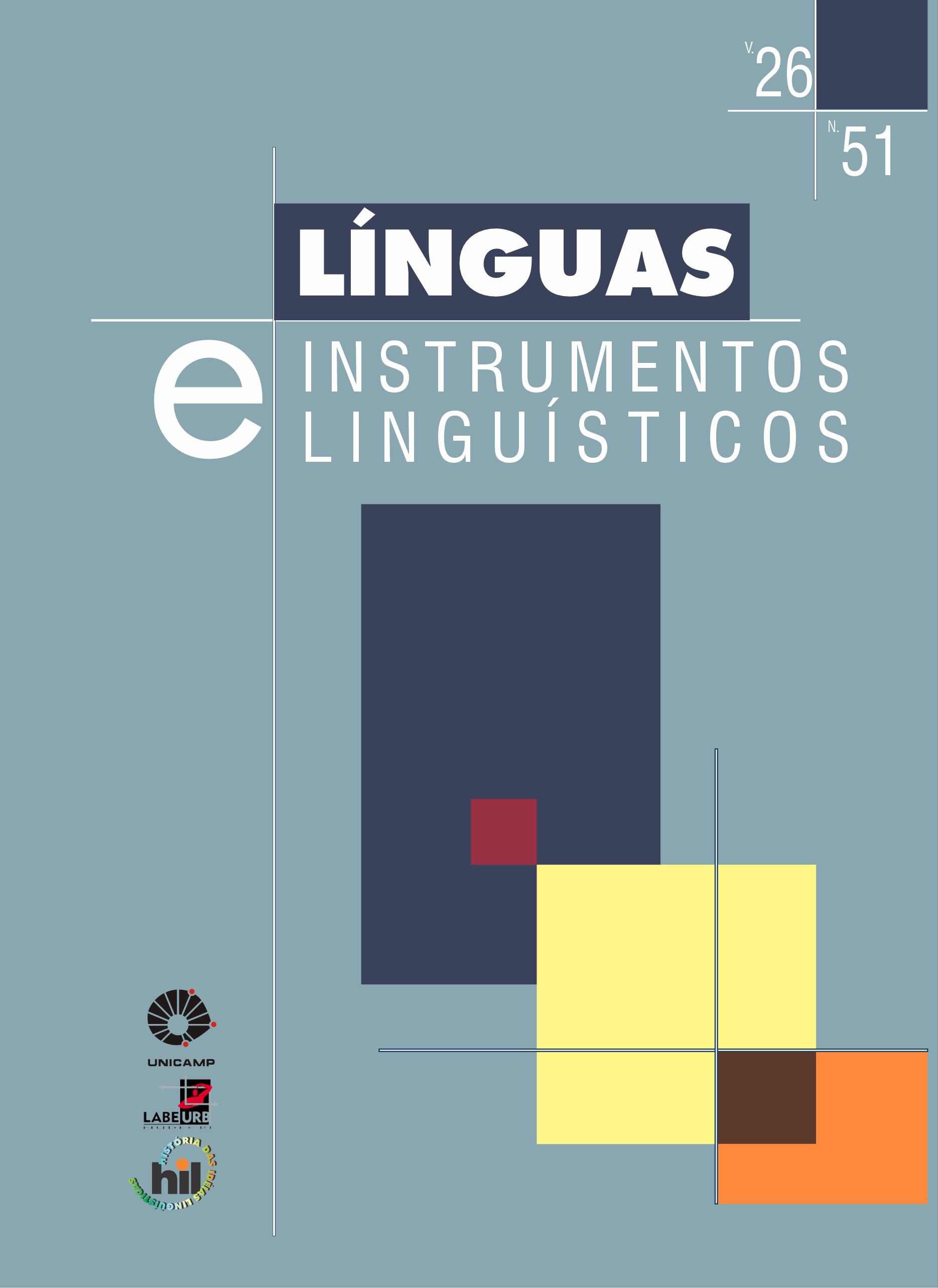Abstract
In this work, we carried out a semantic-enunciative study of the word femicide, analyzing its designations from the Semantic theory of the Event. The corpus of the work consists of definitions of this word in the Brazilian Law 13.104/2015, in the Portuguese Online Dictionary and in the Houaiss Uol dictionary. The movement of meanings of the word femicide in different enunciative scenes as a way of showing its importance for denouncing violence against women instigated us theoretically. We take the dictionary and the Law as grammatization instruments, thus placing ourselves in the field of the History of Linguistic Ideas. In this way, we consider the dictionary, as well as Law 13.104/2015, a linguistic, historical and social instrument that allows us to observe, through the designation which are the meanings kept, which are divided, which are added and which are the possible silencing. We will use the concepts of enunciation, designation and enunciation space, as conceived by Guimarães (1995, 2002, 2018). For the analysis, we took into account the polysemy of the language that seeks to signify, re-signify the real, and, in this case, give visibility to meanings ignored by society, in view of the Brazilian reality, the 5th country with the highest rate of murders of females in the world.
References
ALTHUSSER, L. Aparelhos Ideológicos do Estado: nota sobre aparelhos ideológicos do Estado. Rio de Janeiro: Edições Graal, 1985.
AUROUX, S. A revolução tecnológica da gramatização. Tradução de Eni Puccinelli Orlandi. 3. ed. Campinas, SP: UNICAMP, 2014 [1992].
BEAUVOIR, S. O segundo sexo. Tradução de Sérgio Milliet. 4.ed. São Paulo: Difusão Européia do Livro, 1970.
BUTLER, J. Problemas de gênero: feminismo e subversão da identidade. Tradução de Renato Aguiar. Rio de Janeiro: Civilização Brasileira, 2010.
BRASIL. Lei do Feminicídio/2015. Disponível em: L13104 (planalto.gov.br). Acesso em: 14/12/2021.
BRASIL. Convenção sobre a Eliminação de Todas as Formas de Discriminação contra a Mulher, 2002. Disponível em: D4377 (planalto.gov.br). Acesso em: 14/02/2022.
CAMPOS, C. H. Feminicídio no Brasil: uma análise crítico-feminista. In Sistema Penal e Violência, 2016, p. 103-115.
GUIMARÃES, E. Semântica do Acontecimento. Campinas: Pontes, 2002.
GUIMARÃES. E. Semântica, Enunciação e Sentido. Campinas: Pontes, 2018.
GUIMARÃES, E. Domínio Semântico de Determinação. In A palavra: forma e sentido. Maria Cecília Mollica e Eduardo Guimarães (Orgs). Campinas: Pontes Editores, RG, 2007.
GUIMARÃES, E. Texto e Argumentação. Campinas: Pontes, 1987.
FEMINICÍDIO. In: DICÍO, Dicionário Online de Português. Porto, 7 Graus. Disponível em: https://www.dicio.com.br/. Acesso em: 12/06/2022
FEMINICÍDIO. In. Dicionário Houaiss Uol. BRASIL, Instituto Antônio Houaiss. Disponível em: https://houaiss.uol.com.br/corporativo/apps/uol_www/v6-1/html/index.php#2. BRASIL, Acesso em 12/06/ 2022.
FERREIRA, A. C. F. A análise de discurso e a constituição de uma História das Ideias Linguísticas do Brasil. Fragmentum, Santa Maria, n. Especial, p. 17-47, 2018.
LEANDRO FERREIRA, Maria C. Da ambiguidade ao equívoco: a resistência da língua nos limites da sintaxe. Porto Alegre: Ed. Universidade/UFRGS, 2000.
MACHADO, C. de P. A designação da palavra preconceito em dicionários atuais. 134 p. Dissertação de mestrado, Programa de Pós-Graduação em Linguística, Instituto de Estudos da Linguagem – Universidade Estadual de Campinas. Campinas: 2007.
OLIVEIRA, S. E. Sobre o funcionamento do político na Linguagem. In: Linguagens e Instrumentos Linguísticos, 2014, p. 41-53.
OLIVEIRA, S. E. Cidadania: história política de uma palavra. Campinas: Pontes Editores, RG Editores, 2006.
ORLANDI, ENI. Análise De Discurso: princípios e procedimentos. 12. ed. Campinas: Pontes Editores, 2015.
ORLANDI, E. As formas do silêncio: no movimento dos sentidos. 6. ed. Campinas: Ed. Unicamp, 2007.
ORLANDI, E Apresentação. In: ORLANDI, Eni P. (Org.). História das Ideias Linguísticas: construção do saber metalinguístico e constituição da língua nacional. Campinas/Cáceres: Pontes/Unemat, 2001. p. 7-20.
ROMIO, J. A. F. Sobre o feminicídio, o direito da mulher nomear suas experiências. Revista do Programa de Pós-graduação em Sociologia da Universidade de São Paulo, São Paulo, v.26.1, 2019, p. 79-102. de Janeiro, n.20.

This work is licensed under a Creative Commons Attribution-NonCommercial-ShareAlike 4.0 International License.
Copyright (c) 2023 Línguas e Instrumentos Linguísticos


